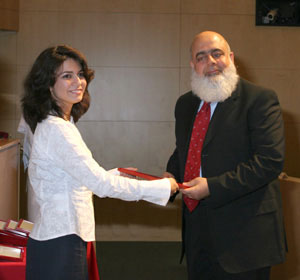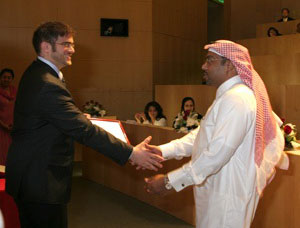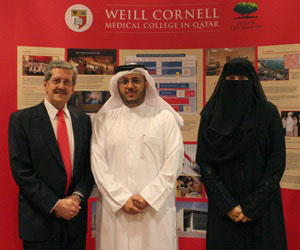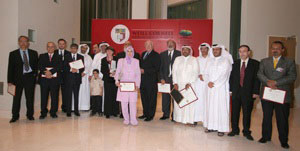WCMC-Q medical students thank their HMC preceptors

Maryam Shafaee (Class of 2008) presents
Dr. Mohammed Tariq Butt with a certificate in
recognition of his work as a preceptor.
Medical students gathered to thank their Hamad Medical Corporation (HMC) preceptors during an evening celebration held at WCMC-Q, April 11th.
The preceptors are HMC physicians who hold faculty appointments at Weill Cornell Medical College. They guide the students as they begin to acquire the skills of the physician during the first and second year introductory clinical courses, and the clinical part of the second year Brain and Mind course.
In recognition of this important role, the medical students presented their preceptors with certificates, before joining them for a gala dinner.
“I’ve had two preceptors this year,” said Rana Biary (Class of 2008), after the formal presentation. “They were wonderful – I’ve learned so much from them.”
Looking back over the preceptorships in the Medicine, Patients and Society I and II (MPS I and II) courses, Biary commented that they provided a firm and confidence-building foundation in patient care ahead of the clinical clerkships, which start early July. “I can’t wait until the third year! I feel that, as a class, we are very well prepared,” she said.
First year medical students Manisha Deb Roy and Noor Suleiman explained that the MPS courses are the link between what they learn in the basic sciences and the care of patients.
“The preceptorships in MPS I gave us the feel of what it’s like to be a doctor,” said Deb Roy. “Most of the patients were very cooperative and wanted to help us learn. They didn’t mind us observing the doctor examining them or doing the interview, or if a doctor talked about their problem in front of them.”

Imran Farooq (Class of 2009) thanks
Dr. Khalid Al Bader for his work as a preceptor.
For Suleiman, seeing the reality of the physician’s practice was instructive on many levels. “The preceptorship gives you a hands-on experience; you get engaged in the actual situation in the hospital, including the administrative side.”
Dr. Khalid Al Bader, a specialist in the department of primary health care and family medicine of HMC, said: “It is crucial for the students to get experience outside the classroom and in the clinics and hospitals from an early stage of their education. This way, they will like medicine, and be able to integrate the information they are learning with practice.”
Preceptors “role models” for the students
Dean of the Medical College, Dr. Daniel R. Alonso, began the evening’s celebration by welcoming the preceptors and paying tribute to them “for what they have taught our students, the way they have mentored them, and the role model they have been.”
The number of preceptors increased from 18 in 2004-2005 to 32 this academic year, with the promise of further increase as the Medical Program moves into the clinical stage in July, Dr. Alonso noted.
Senior Associate Dean for Education, Dr. Elizabeth Alger, told the assembled students, faculty, guests and staff about the benefits of introducing “meaningful patient contact” for students from year one, an approach adopted by US medical schools from the 1980s.

The ceremony was a proud occasion for
Dr. Ibrahim Al Shaar, seen here with Dr. Alonso
and medical student Sara Hassan.
“Faculty noticed the greater level of maturity, improved understanding of the process of clinical reasoning, and professionalism in approach to patients,” on the part of the students, she said.
She thanked assistant professor of medicine and course director for MPS I, Dr. Wendy Terry; assistant professor of medicine and course director for MPS II, Dr. Nounou Taleghani; associate professor of neuroscience and neurology, and course director for Brain and Mind, Dr. Leopold Streletz; and the HMC preceptors, for their contribution to implementation of the clinical component of the Medical Program at WCMC-Q.
“We have a growing cadre of HMC colleagues who are accomplishing the same as their colleagues in New York,” Dr. Alger said.
All-round benefits of preceptorships
The recent multi-station objective structured clinical examinations (OSCEs), performed by members of the Class of 2008 for the first time, showed how well prepared they are for the third year clinical clerkships, she noted.
“One of the most heart-warming and gratifying things was to see the students’ professionalism, their focus and their ability to work through the cases, which was not easy because the (standardized) patients were in pain.”

Preceptors who work in primary health centers
and HMC outpatient departments, as well as senior
officials from seven HMC departments, received
certificates.
Concurring with this viewpoint, Biary said: “The medical students (at Weill Cornell Medical College in New York) usually do multi-station OSCEs during the fourth year. Here, they have been gearing us towards a multi-station session this year. I feel that, as a class, we have done very well, even though none of us practiced for it because we had an exam that morning.”
Among the HMC preceptors, there was also a feeling of having gained from the role they played in educating the medical students. “As program director of medicine, I’m interested in teaching,” said Dr. Samar Al Emadi. “It’s a continuous and rewarding educational experience for me – and it gives me added enthusiasm to go on learning, to stretch my knowledge.”
Sylvia Ismail, Associate Editor
additional reporting by Krista Dobinson, Assistant Editor/Writer
